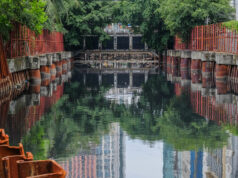Philippines, Malaysia spar online over Sabah
THE PHILIPPINES and Malaysia revived a long-standing territorial dispute after their top diplomats sparred on Twitter over ownership of the Malaysian state of Sabah.
Malaysian Foreign Minister Hishamuddin Hussein on Wednesday tweeted that he would summon the Philippine ambassador over his Philippine counterpart’s July 27 tweet that Sabah is not in Malaysia.
“This is an irresponsible statement that affects bilateral ties,” Mr. Hussein said. Sabah is, and will always be, part of Malaysia,” he said, adding that he would ask the Philippine ambassador to explain.
Mr. Locsin on Thursday fired back by tweeting that he would also summon the Malaysian ambassador in Manila.
“Sabah is not in Malaysia if you want to have anything to do with the Philippines,” the top Philippine envoy tweeted on July 27, reacting to a US Embassy post describing the area between the Southeast Asian nations as part of Malaysia.
Mr. Locsin on Thursday stood by his statement. “No country can tell another what it can and cannot say about what the latter regards as rightfully its own,” he said.
“I don’t insist China say only what we want to hear about the arbitral award,” he said, referring to a 2016 UN ruling rejecting China’s claim to more than 80% of the South China Sea. “It is free to say what it wants while we say and do what needs doing. That holds for Sabah,” he added.
“And that’s China we’re talking about — the second biggest economy and military power in the 21st century,” Mr. Locsin said. “I am summoning the Malaysian ambassador.”
Mr. Locsin cited previous meeting with two Chinese ambassadors “time and again to talk about our differences, sometimes heatedly but always forthrightly.” He added that he had “never objected to China making contrary claims, nor China to me doing the same with our uncompromising stand.”
“That’s diplomacy,” he said.
He also said in a separate post he would take the issue up with the US Department of State.
The oil-rich state of Sabah, a territory that is part of Malaysia’s northern Borneo, has been a thorny issue between the Philippines and Malaysia for decades. About 200 armed followers of a self-proclaimed sultan of Sulu in southern Philippines invaded Sabah state in February 2013, leading to clashes that killed several dozens.
The Sulu Sultanate claims to have leased Sabah to the British North Borneo Company in 1878, a deal that Kuala Lumpur sees as an act of abandonment.
The sultans of Sulu once ruled over Sabah and the Sulu islands. Sabah fell under British control after World War II and joined Malaysia in 1963, shortly after the sultanate ceded sovereignty to the Philippines.
Sabah has abundant natural resources. Its primary exports include oil, gas, timber and palm oil and its other major industries are agriculture and ecotourism.
Mr. Locsin said the Philippines would continue to assert its rights over Sabah and in the South China Sea.
“We have and continue to assert our rights,” he said in a tweet. “I am doing that with regard to Sabah. There have been repeated attempts to sell that claim but no Philippine president has succumbed. You’re really stupid,” he said, addressing a netizen.
‘FRIENDLY TIES’
“He was already summoned, it was about to happen,” Mr. Locsin said in another tweet. “They are always trying to sneak in an attempt to implicitly abandon our claim. But I warned our diplomats: ‘Never.’”
Philippine Senate President Vicente C. Sotto III backed Mr. Locsin on social media, noting that “even until recently, the heirs of the Sultanate of Sulu had been receiving rental payments for the occupancy of Sabah.”
Malaysia has stopped paying cession money worth RM5,300 or about P61,300 a year since 2013, Malaysian news agency Bermara said in a July 22 report, citing Mr. Hussein.
The Philippines will pursue friendly ties with Malaysia despite maintaining its claim over the Sabah state, Presidential Spokesman Harry L. Roque said at an online news briefing. He said Sabah was given by the Sultanate of Brunei to the Philippines.
He added that the territorial dispute won’t get resolved soon, and the Philippine government would continue its diplomatic relations with Malaysia.
“This matter should not affect our ongoing bilateral ties with Malaysia,” Mr. Roque said. “It has not affected it in recent years and we will continue to have healthy bilateral relations with Malaysia despite the conflict on Sabah.”
President Rodrigo R. Duterte said during his election campaign in 2016 he would pursue the Philippines’ territorial claim over one of Malaysia’s 13 states.
In 2016, the Philippines, Malaysia and Indonesia signed a cooperation deal where their navies would work together in fighting Islamic militants in the Sulu Sea. Mr. Duterte and former Malaysian Prime Minister Najib Razak also agreed to set aside the Sabah dispute.
The Philippines has been transporting Filipinos from Sabah back to their home provinces as part of measures to help undocumented Filipinos affected by the global coronavirus pandemic.
This was the subject of Mr. Locsin’s tweet on Monday, in which he reacted to the US Embassy post on aid it had given to “returning Filipino repatriates from Sabah, Malaysia.”
The US Embassy had not deleted or changed the tweet even if Mr. Locsin had urged the embassy to edit the announcement if it knows “what’s good for you.” — Charmaine A. Tadalan and Gillian M. Cortez



